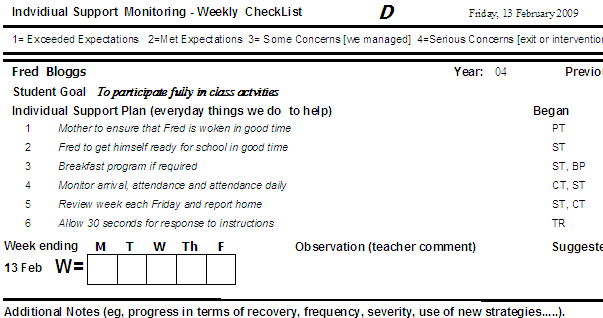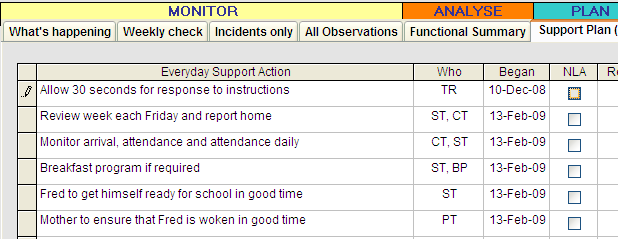![]()
----------------
See also...
Focus on 'what works' to provide for 'what is needed'
There is a simple choice: you can focus on the problems or on what works (solutions).
It is natural to think that problems and 'solutions' are closely connected but, when it
comes to human beings, this is often not the case, see Solution Focus.
The Support Planner is intended to help users focus on what works!!
A long term, wide-ranging, whole-of-school challenge
There are many forms of individual support covering a wide range of needs related one or more of the following;
- Behaviour: many schools have taken part in the Department's Positive Behaviour Support initiative beginning in 2006. See other online resources at the end of this page.
- Learning: all schools have students with learning needs and it has been common practice to develop IEPs
- Disabilities: most schools students with special needs associated with disability: hearing impairment, autism...
- Social or economic disadvantage: all schools have students with social needs
- Health issues: most schools have students with diabetes, peanut allergies....
- ....
Individual Support Plans (ISPs)
Individual Support Plans come in many forms to address educational and social needs. They relate to behaviour, disability, high ability or something as simple as attendance.
ISPs focus on support that will make it easier for the student to achieve on-going success and well-being on a sustainable basis.
The Planner is useful in managing one-off support initiatives such as case meeting, assessments and reviews. In addition, ISPs in the Planner focus on the everyday things that make it easier for the students, their teachers and staff to achieve success and well-being.
For example, PBS is based on the notion that long term success and well-being are usually achieved by the positive behaviour of all concerned:
- a less difficult environment
- responses that are helpful
- learning that enables the person to better meet their own needs easily and well
Individual Support can be understood in a number of ways:
- one-off interventions and arrangements such as planning, assessments, particular programs...
- support is provided as positive behaviour by the provider* including coaching and modelling
- everyday support that will promote positive action by the student towards self, others and property in the normal engagement of the student in classes and other school situations
*Note: This latter approach is in contrast to the common use of counter measures (such as consequences) that respond explicitly to the student's negative behaviour. Most negative behaviour has its own very significant consequences for the student. Rather than adding to the consequences it is often more constructive to assist a student to understand the natural consequences of his/her actions.
A goal and three key areas for attention
Individual Support Plans (actions) focus on four key areas that shape the capacity of the student to behave positively (achieve success and well-being)
- The goal to be achieved with the support provided
- Managing the student's environment so that it makes it easier for the student to succeed
- Providing educational initiatives so that the student can manage his/her own behaviour better
- Making the most helpful (positive) responses to the student's behaviour (inappropriate or otherwise)
And all of the above in a timely manner. Hence the key role of the adult (teacher, aide...) on the spot.
Follow these links for
- a Quick Planner includes a goal and three to five individual support actions
- a more extensive ISP template useful for an in-depth planning
Entering an ISP - Key Actions
The Support Planner has great potential to support schools. In particular, the Planner will be very useful in capturing, communicating and monitoring the key actions that will central to the success of ISP for each student. In the Planner...
1. Identify particular student by ticking the IS Plan box and the Monitor box in their record
2. Enter a meaningful goal for the student - the next achievable thing
that the student can do and will contribute to his/her success and well-being
3. Click on the Support Plan (ISP) tab
4. Enter 3 to 5 everyday support: the things that staff can do in everyday situations
to support the student
- Use clever coding to suit if you find this useful, eg, in entering Support Actions just code
- how responses will be managed RE/ to ensure that the student receives re-enforcers for positive behaviour (not problem behaviour)
- things to be taught ED/ to replace or meet the same function as the student's problematic behaviour and to improve the student's ability to function more effectively
- environmental adjustments EN/ that will be used to make the student's problematic behaviour unnecessary
5. Link to a Individual Support Plan (sample) for more comprehensive planning and documentation
Making it easier for those who 'have to do it'
This coding will enable better practices to be well supported. The ISP Weekly checklist uses the '+' to select data for the consideration by the teacher(s) working with the student. . This report (below) prompts teachers to attend to the key elements of the Individual Support Plan:
- what is working? when?, where?
- what is not?
- what else might be possible and in the best interests of the student
Note this can be printed out at any time by clicking the IS Plan button (just above the Goal)
Everyday Monitoring and Weekly checking
You will want to monitor some students and capture data each day.
To do this just tick their Monitor tickbox.
![]()
As well as alerting users to the fact that this student is being monitored on a daily basis
ticking this box will ensure that this student's IS Plan is provided to the teacher in the Weekly Checklist:

The checklist also enables class teachers to record (very simply) how the student is managing and then to summarise the overall week in a note or two for future attention. Properly managed this could be very powerful for all concerned. For example, the data returned by the teacher can be quickly entered into the Concerns section, eg,

In this school they use a four point scale: 1= exceeds expectations to 4 = serious concerns.
NOTE: The daily ratings are in relation to the particular goal for this student, in this case "To participate fully in class activities".
This record indicates that for the week ending 23/3 Joshua's in-class participation ranged from 4 (serious concerns) on Monday to 2 (meeting expectations) on Thursday and Friday. As part of this participation, the teacher also reported a significant reduction in the noises produced by Joshua in class. Did you notice that Joshua was absent on Wednesday?
These records provide an ongoing day-by-day record that may be useful for reporting and a range of other purposes. The ISP Results - Variable report provides this data back to class teachers
This data is valuable material for discussion and working with Joshua to support him in improving. Over several weeks the data may reveal patterns such as
- particular days of the week that may be problematic for Joshua
- overall trends (improvement or otherwise)
- exceptions (a sudden decline may be worth prompt consideration).
- when to reduce particular individual support elements
Long term views of student progress can be seen by using the ISP Results Report.
ISPs in Secondary Schools - under development
The use of the ISP Weekly Checklist develops fairly naturally in primary schools, mainly because of the central and extensive role of the class teacher.
In secondary schools there are two likely contexts in which the Checklist might be useful
(1) Class teacher period: the checklist provides some of the 'agenda' for Class Teacher period (discreetly of course). It would provide an opportunity for class teachers to work with particular students about
- what's working (helpful) and what's not (leads to new insights and ongoing improvement of the student's ISP)
- coaching for success today
- rating for each day by both teacher and student
Note: the rating would probably be for the previous day if class teacher period is first thing in the morning.
(2) Grade level team meetings: the Checklist provides some of the agenda for these sessions
- It lists students with ISPs (and by implication who doesn't)
- Everyone can be reminded about approaches to particular students
- Team members can compare notes on
- What's working?
- What's not?
- And what else might be possible?
- ISPs can be shared, amended and improved
- Related teacher practices and school arrangements can be reviewed and improved
Please share your practices and experiences with the discussion list as you develop them.
How difficult?
"Into our 3rd week with ISPs. Teachers are finding it very easy and not onerous, additional comments are very helpful and can be added to agreements and updates."
"We have also started working with our GO to include strategies in the ISP (Individual Support Plan) - very exciting and possibly ground breaking work between disciplines."
- Mario Bergamin (Youngtown)
Closing the loop - at last!!
How to implement recommendations from support professionals (GO, SW...) into everyday class practices? This has been a long standing major challenge. The above provides the means to introduce such recommendations into the classroom on a weekly basis, with reminders each week until not required. With the school's permission, support professionals can simply add their recommendations (as above) using teacher-friendly language, and teachers will receive reminders on a regular basis. It may also be helpful to identify the source of any recommendation. Example: a recommendation from a Guidance Officer to allow a little extra time for a student respond to ordinary instructions might be entered as follows:
- + Allow 15secs for J. to respond to simple instructions (GO)
If a teacher requires some clarification they are able to identify who to contact.
Other forms of individual support
Another common form of individual support relates to the responses we need to make to special needs, eg, allergies and other special conditions. These can also be recorded as part of the ISP actions, eg,
- + PEANUT ALLERGY: use epipen and call ambulance IMMEDIATELY!!
- + Diabetic: allow food in class; blood test at noon; insulin if reqd
- + Bad day? Check on meals and medication
- + Asthmatic: occasional puffer; encourage physical activity; allow choice
- + Hearing impaired: use simple but firm instructions
- ...
The '+' will ensure that these items are included in the weekly ISP Checklists for teachers and relief teachers
Even relief teachers can play a part
And this information would be useful for informing / briefing relief teachers. It could become a routine part of the practice of preparing materials for relief teachers.
Plans, actions and dates
Most actions become current as soon as the Individual Support Plan is devised.
Summary
The Individual Support Planning component of the Planner (3.0p)
- is very simple to operate (minimal data entry, easy print-outs, simple teacher recording...)
- focuses on enabling students to enjoy success and well-being
- enables planning, monitoring, and feedback on a weekly cycle
- brings the class teacher directly into the communication loop
- provides a direct way to communicate recommendations from support professionals to those who will implement them
- prompts continued attention to key recommended or agreed strategies for working with selected students
- provides valuable information to relief teachers and newly appointed teachers
- does all of the above for other critical matters such as peanut allergies...
- provides families/DoE with clear evidence of school initiatives
- ... and (no doubt) other things we haven't thought of yet...
Other online resources
For more information you might want to check out the follow online resources used by the Department


